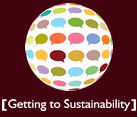The International Integrated Reporting Council (IIRC) will release the consultation draft of the IR framework on 16 April for a three-month comment period from stakeholders. Ahead of that, The Sustainability Report spoke with two Australian companies that are participating in IIRC’s pilot programme – NAB and Stockland – to gauge their views on the utility.
Read more
Blog
Nominations for the Prime Minister’s Environmentalist of the Year and Young Environmentalist of the Year awards opened on 4 February 2013.
The awards recognise those unsung heroes in our community who have made an outstanding contribution in protecting our environment and creating a sustainable future for Australia.
Environment Minister, Tony Burke, encourages any individuals, groups.
Read more
Where governments have failed to act, some big firms have taken matters into their own hands
By Marc Gunther for Guardian Sustainable Business, 26 March 2013
Visitors who climb aboard the steam trains in the Disneyland resort in southern California need not worry about their carbon footprint. The trains are powered by soy-based cooking oil recycled from.
Read more
The European Union has proposed a new package of carbon and renewable energy targets for 2030 that could see the introduction of a 40 per cent carbon reduction target, as well as a 30 per cent share target for renewable energy.
More at Renewecononomy's Mixed Greens by Sophie Vorrath of 28.
Read more
Save now, pay later: the hidden costs of lower electricity bills
By Ian McPhail, University of Southern Queensland No lights, no power, no internet – and no easy solutions. Fumbling around in a middle of a blackout, hoping to find a torch or some spare batteries, I was struck by just how utterly dependent most of us.More angry, more often: March heatwave signals a new normal
By Sophie Lewis, University of Melbourne and Sarah Perkins Daylight hours are dwindling and our first month of autumn is ending. But in many places, March felt a lot like summer. Get used to it: looking ahead, all indications are that future summers could be.
New IGCC reports by the Australian National University on the Mining and Minerals, Property and Construction and Oil and Gas sectors show increasing climate risks for investors.
Reports also show that cost effective mitigation and adaptation opportunities are available.
At the Conference of Major Superannuation Funds yesterday in Brisbane, IGCC launched three new reports examining climate change.
Read more
Australia has staged a fragile reversal in its previously declining low-carbon competitiveness. Asia, especially China, is now taking centre stage in preparedness for the low-carbon economy. These are the two key conclusions of the updated Climate Institute/GE Low-Carbon Competitiveness Index, released today as part of the Institute’s Global Climate Leadership Review 2013 report.
“Australia’s fragile improvement.
Read more
Under the Clean Energy Act 2011, large users of specified taxable liquid fuels can choose to manage their carbon price liability through the carbon pricing mechanism rather than through the fuel tax or excise systems under the operation of the Australian Taxation Office (ATO).
By opting in, the fuel emissions of those companies will be directly covered.
Read more
New research about how Australian companies are adapting to climate change was revealed at a major European conference 18-20 March 2013.
Dr Martina Linnenluecke, a sustainability expert from The University of Queensland Business School, presented the findings at the European Climate Change Adaptation Conference (ECCA) 2013 in Hamburg, Germany. The research by Dr Linnenluecke and her.
Read more
